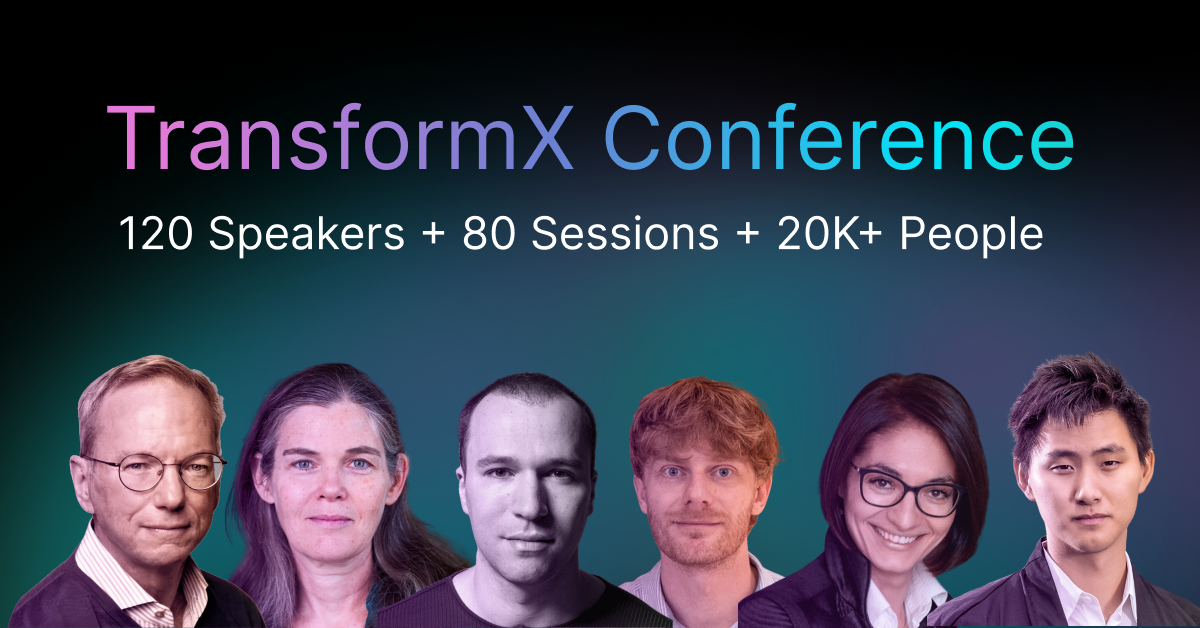In the News

9 Research Papers changing how we see AI
A list of Research papers can be a tool that helps you to foresee the future of AI
Sponsor

TransformX 2022 AI/ML Conference: 20+ Speakers just Announced!
Join us on October 19th - 21st for a 3 day virtual and in-person conference featuring 120 speakers from companies like OpenAI, Waymo, OpenSea and more! You’ll have the chance to attend 80 sessions and network with 20,000+ of the world's top AI visionaries.
Research
We need better AI imagery for better science communication
Research into narratives as forms of sense-making AI has shown that these can impede the public understanding of AI, mask human agency, and reinforce damaging stereotypes. This article shows the result of a research to imagine more helpful visual representations of AI to improve science communication.
Rethinking Stochastic Gradient Descent’s noise
This post shows that the instance of Stochastic Gradient Descent (SGD) used to solve modern ML problems carries rich particularities. In particular, we will put emphasis on the difference between the under and overparametrised regimes.
How Cohere is accelerating language model training with Google Cloud TPUs
Over the past few years, advances in training large language models (LLMs) have moved natural language processing (NLP) from a bleeding-edge technology that few companies could access, to a powerful component of many common applications.
Applied use cases
Protein-Designing AI Opens Door to Medicines Humans Couldn’t Dream Up
Designing a protein is a bit like making a cabinet. The first step is building the backbone that holds the protein together. But then comes the hard part: figuring out where to install hinges on the scaffold—that is, finding the best “hotspots”—to put on doors, shelves, and other attachments that ultimately make the cabinet fully functional.
Ubenwa is using AI to diagnose neurological issues through baby cries
Using machine learning, Ubenwa – which means the cry of a child in the Igbo language – claims it can decipher baby cries to detect and diagnose medical conditions that have traditionally been difficult to diagnose
Artificial Intelligence Discovers Alternative Physics
A new Columbia University AI program observed physical phenomena and uncovered relevant variables—a necessary precursor to any physics theory. But the variables it discovered were unexpected.
Market News
Google fires Blake Lemoine, the engineer who claimed AI chatbot is a person
Google has fired Blake Lemoine, the software engineer who was previously put on paid leave after claiming the company's LaMDA chatbot is sentient. Google said Lemoine, who worked in the company's Responsible AI unit, violated data security policies.
Seedtag, the ex-Googler-founded, cookie-free, AI-based adtech startup, taps $250M+ in funding
Seedtag, a contextual advertising startup that uses AI tools both to “read” content on a page to match that up with advertisers’ aims, as well as to subsequently track how those ads perform, has raised “over” €250 million (more than $252 million, exact amount unspecified).
Explained: How to tell if artificial intelligence is working the way we want it to
“Interpretability methods” seek to shed light on how machine-learning models make predictions, but researchers say to proceed with caution.
Ethics
What We Can All Learn From How Jewish Law Defines Personhood in AI, Animals, and Aliens
Religious language, with its emphasis on human value as a core, unshakeable idea, is a useful lens through which we can have a conversation that transcends—but does not replace—the boundaries of A.I.
AI development is risky with or without sentience
This article reflects on the risks posed by AI to human extinctions. It concludes that whether it will turn out to be the best or the worst thing humanity has ever achieved remains disturbingly uncertain.
Transhumanist Anders Sandberg: Embrace Strangeness
Dr. Anders Sandberg is a well-known transhumanist, futurist, computational neuroscientist, and currently a research fellow at the Future of Humanity Institute at Oxford University.
Robotics
The Omnid Mocobots: New mobile robots for safe and effective collaboration
Researchers at Northwestern University's Center for Robotics and Biosystems have recently developed new collaborative mobile robots, dubbed Omnid Mocobots. The inspiration for the current work was manufacturing, warehouse, and construction tasks.
MIT News : Warehouse robots that feel by sight
Discussion with Ted Adelson - an expert in both human and machine vision. He was has created something useful. But he never lost sight of his original dream: to endow robots with a sense of touch.
Harmonizing human-robot interactions for a ‘new and weird’ world of work
Clara Vu and Rod Brooks explains at TC Session: Robotics Robots have always found it a challenge to work with people and vice versa.


